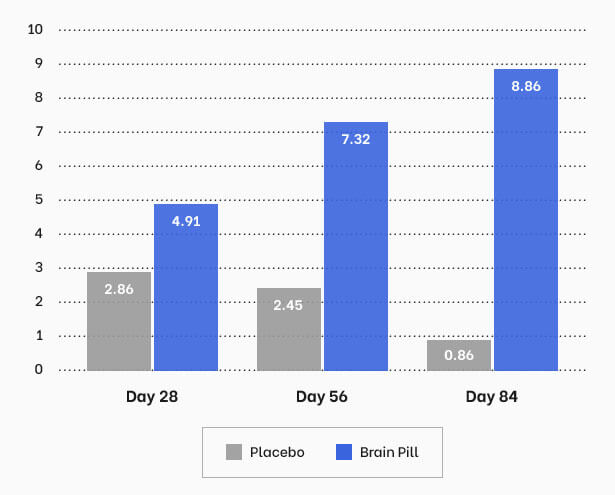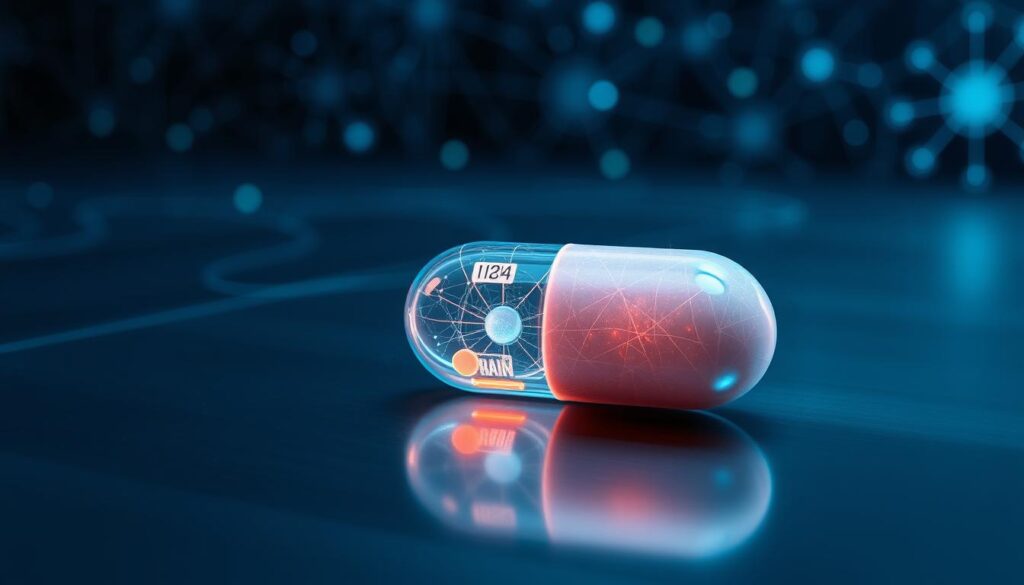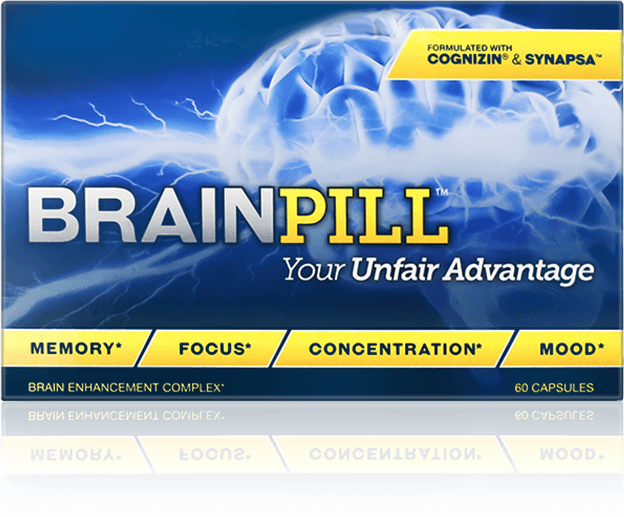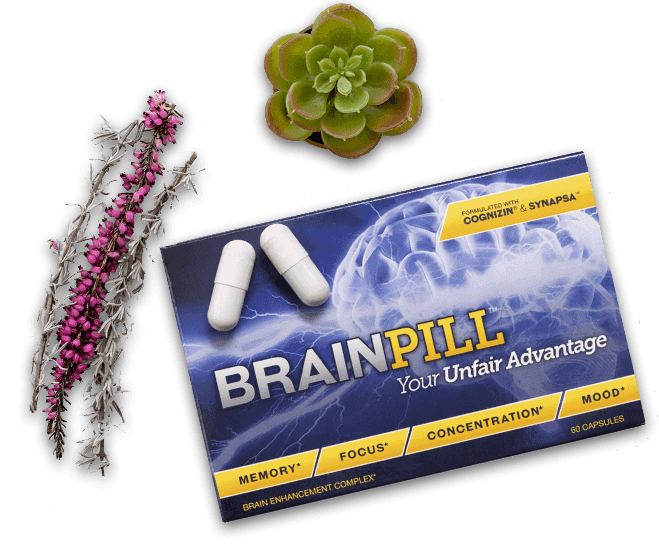As I sit here, staring at the computer screen, I feel frustrated. The deadline is near, and my brain is tired. I wish I could boost my thinking and unlock my mind’s full power. That’s why I’m looking into “brain pills” or nootropics.
These “smart drugs” claim to improve focus, memory, and brain function. But are they really the solution to my productivity problems?
I’ve heard they can help me do better in school, get a promotion, or fight off aging’s mental effects. But with so many choices, it’s hard to know which one is the best. The market is full of nootropics, but not all have solid science to support their claims.
Key Takeaways
- Nootropics, or “smart drugs,” are becoming increasingly popular for their potential to boost cognitive performance.
- The effectiveness of nootropics varies, and not all have strong scientific backing.
- Prescription nootropics can be helpful for specific medical conditions, but the use of cognitive enhancers in healthy people is more controversial.
- Natural nootropic supplements like BrainPiil, L-theanine, CDP-choline, and Bacopa Monnieri may offer cognitive benefits with fewer side effects.
- Lifestyle factors like sleep, exercise, and diet also play a crucial role in optimal brain health and performance.
What is the Most Powerful Brain Pill?
“Nootropics” are substances that might boost your brain power. They come in three types: natural supplements, synthetic compounds, and prescription drugs. While some prescription nootropics help with medical issues, using them for brain enhancement is debated. Experts say the right mix of natural and synthetic nootropics can give you an edge, but use them wisely since we don’t fully understand the brain.
Nootropics, or smart drugs, are becoming more popular. They include dietary supplements, synthetic compounds, and prescription drugs. Caffeine, a well-known nootropic, can enhance thinking and release neurotransmitters like acetylcholine. However, some supplements like ginseng and gingko haven’t been proven to work. Prescription nootropics, like those for ADHD, can have side effects like insomnia and addiction.
Modafinil, a prescription nootropic, is FDA-approved for sleep disorders and may improve learning and memory in healthy people. But, studies on nootropics are limited, and brain chemistry varies, affecting how well they work. Natural nootropics like BrainPill, L-theanine, CDP-choline, creatine monohydrate, and Bacopa monnieri show promise.
Too much pure caffeine powder can be dangerous. CDP-choline may help memory in people with dementia. Creatine monohydrate could boost reasoning and short-term memory but should be used carefully by those with kidney issues. Bacopa monnieri might speed up information processing but can cause stomach problems. It’s best not to mix nootropics without a doctor’s advice.
Also, 25% of adults over 50 take brain health supplements. Omega-3 supplements haven’t been proven to improve cognitive function, except for those with the APOE4 gene mutation. L-theanine might enhance mental performance when paired with caffeine, but more research is needed. Ginkgo supplements didn’t slow dementia in large studies, including the Ginkgo Evaluation Memory study with 3,000 older adults. Ginseng hasn’t been shown to be a strong brain booster in high-quality trials. Curcumin, found in turmeric, may improve memory and reduce brain protein buildup in a small study.
Understanding Nootropics: Smart Drugs Explained
Nootropics, also called “smart drugs,” are substances that might boost brain function. This includes better focus, memory, and brain health. They come in three types: natural supplements, synthetic compounds, and prescription drugs. Nootropics work by affecting neurotransmitters, protecting brain cells, and supporting brain health.
Types of Nootropics
Nootropics fall into several categories based on their source and makeup:
- Dietary Supplements: These include natural substances like caffeine, BrainPill, L-theanine, CDP-choline, creatine, Bacopa monnieri, Panax ginseng, and Ginkgo biloba.
- Synthetic Compounds: Examples of synthetic nootropics include Noopept, Piracetam, Phenotropil, and Modafinil.
- Prescription Drugs: Stimulants like Adderall and Ritalin, often used for ADHD, are sometimes used by healthy people as nootropics.
Mechanisms of Action
Nootropics work in many ways. Caffeine, for example, acts as a stimulant, making us more alert and focused. L-theanine has a calming effect and can increase brain activity, possibly boosting creativity. Creatine and Bacopa monnieri improve memory and processing, while Panax ginseng and Ginkgo biloba enhance brain function.
Synthetic nootropics like Noopept, Piracetam, and Phenotropil affect neurotransmitters, protect brain cells, and support cognitive functions.
The effectiveness of nootropics can differ from person to person. It depends on the substance and dosage used. It’s crucial to do thorough research and try them carefully to see their benefits.
Prescription Nootropics: Benefits and Risks
Prescription nootropics, also known as “smart drugs,” are mainly used to treat ADHD and narcolepsy. They can help those with these conditions. But, using them just to get smarter is risky.
Drugs like modafinil (Provigil), Adderall, and methylphenidate (Ritalin) are prescription nootropics. They can cause sleep problems, nervousness, and heart rate increases. They can even lead to addiction. Also, taking them without a prescription is illegal because they are controlled substances.
Prescription nootropics help those with real medical needs, not just anyone wanting to focus better. The dangers of misuse, like health problems and legal trouble, are too great for those without a medical reason.
For those wanting to boost their brain power, natural options like dietary supplements and herbal extracts are safer. Ginkgo biloba, Panax ginseng, and Rhodiola might help the brain without the risks of prescription drugs.
Always talk to a doctor before trying any nootropics, whether they’re prescription or natural. This ensures they’re safe and won’t interact with other medicines or health issues. Knowing the risks and benefits helps make the best choice for brain health.
Top Natural Nootropic Supplements for Brain Enhancement
Prescription nootropics can be risky, but natural supplements offer safer options. They help improve brain function and performance without the dangers of prescription drugs.
- BRAIN PILL CAN HELP IF YOU:
- Suffer from heavy brain fog.
- Can’t think like you used to.
- Get “stuck” in your own head.
- Have difficulty with your memory.
- Have a mentally challenging job.
- Experience a lot of mental stress.
- Lose mental stamina by mid-day.
- Have trouble staying focused and on task.
- Feel mentally drained at the end of the day
- Need to work long, productive hours.
- Feel mentally exhausted.
- Have a “fuzzy” mind in the morning.
- Keep “spacing-out” during the day.
- Want to feel on top of your game.
- Wish to have a mental edge.
- Want to feel confident in your mental abilities.
- Need to be more productive when it matters most.
- Constantly have to learn new things at work.
Try It Today – Click Here To Visit The Oficial Website
2. L-Theanine: The Green Tea Wonder
L-theanine is found in green tea and boosts the effects of caffeine without the jitters. It helps you stay calm and focused, improving your attention.
3. CDP-Choline: Memory Booster
CDP-choline is found naturally in our bodies and improves memory, especially in those with vascular dementia. It’s key for brain function and supports cognitive health.
4. Creatine Monohydrate: Fuel for the Brain
Creatine monohydrate, known for muscle building, also boosts reasoning and short-term memory. It gives the brain the energy it needs to perform well.
5. Bacopa Monnieri: Ancient Herb for Modern Minds
Bacopa monnieri, an Ayurvedic herb, helps the brain process information faster by growing nerve cell branches. It offers cognitive benefits and antioxidant properties.
| Nootropic Supplement | Key Benefits | Research Evidence |
|---|---|---|
| Brain Pill | Enhances mental focus, reduces anxiety | 10 |
| CDP-Choline | Improves memory, supports cognitive health | 1011, |
| Creatine Monohydrate | Enhances reasoning skills, short-term memory | 1011, |
| Bacopa Monnieri | Promotes faster information processing, antioxidant effects | 1012, |
Natural nootropic supplements can enhance cognitive function safely. Knowing their benefits and how they work helps make smart choices for brain health and performance.
“Incorporating natural nootropics into a healthy lifestyle can be a safe and effective way to optimize brain function.”
You Can Eliminate Brain Fog For Good.
Synthetic Nootropics: A Closer Look
Natural supplements like L-theanine and Bacopa Monnieri are popular for boosting brain power. But synthetic nootropics, like the racetam family, are also worth looking into. They are sold over-the-counter in the U.S., but are prescription drugs elsewhere.
Synthetic synthetic nootropics have a lot of research backing them, especially for older adults. They work by changing how neurotransmitters work in the brain. This can help with memory, focus, and brain function.
But, it’s key to remember that the long-term safety of many synthetic synthetic nootropics is still being studied. They might improve brain function, but they can also have side effects and interact with other drugs.
If you’re thinking about trying synthetic synthetic nootropics, talk to a doctor first. Do your homework to make sure you’re making a safe choice. Remember, improving your mind is just one part of staying healthy.
“The future of cognitive enhancement likely lies in a thoughtful integration of both natural and synthetic synthetic nootropics, tailored to individual needs and preferences.”
Building the Perfect Nootropic Stack
Many people want to mix different nootropic supplements to boost their brain power. But experts say this can be risky because we don’t know how these mixes work over time. They suggest starting with one or two supplements at a time. This way, you can see how they work before adding more.
They warn against getting used to these supplements too quickly. If you do, you might need to take more to feel the effects. Taking it slow helps you understand how your body reacts. This way, you can make your stack better without harming your brain.
When mixing nootropics, think about how they work together. For example, adding DHA from fish oil to resveratrol from red fruits could be great. DHA is key for brain cells, and resveratrol helps keep memory sharp.
Also, mixing caffeine with L-theanine from green tea could be smart. Caffeine boosts brain function, and L-theanine helps you stay calm and focused.
The secret to a great nootropic stack is patience and careful planning. Let your body adjust to each supplement before adding more. This careful approach helps you get the most out of nootropics without risks.

Increase In Cognitive Function With Brain Pill®
Nootropics and Brain Health: Myths vs. Facts
Nootropics, or “smart drugs,” have many myths around them. They are known for their potential to improve brain function. But, it’s important to know the truth from the myths.
One myth is that nootropics can make you smarter forever. The truth is, any benefits from nootropics are short-lived. They stop working once you stop using them. Also, nootropics are not a fix for serious mental health issues. They should not replace doctor-prescribed medicines.
Many think the nootropics market is closely watched for safety. But, the truth is different. Companies only need to show their products have allowed ingredients. They also need to follow some guidelines for health claims. This lack of strict rules worries many about the safety of nootropics.
Despite their popularity, there’s not enough science backing many nootropic claims. Some ingredients, like L-theanine in green tea, might help when mixed with caffeine. But, the science on nootropics is still mixed.
Another myth is that nootropics can stop or cure brain problems like dementia. This is not true. There’s no cure for dementia yet, despite research. Experts say eating foods with nootropic properties might be better than taking supplements.
In short, be careful with nootropics and talk to a doctor before using them. While they might help a bit, the myths about their long-term effects are wrong. Knowing the facts helps make better choices for brain health and avoids false hopes.
| Myth | Fact |
|---|---|
| Nootropics can permanently enhance brain function or make someone “smarter”. | Any cognitive improvements from nootropics are temporary and will dissipate once use is discontinued. |
| Nootropics are a substitute for prescription medications and can cure mental health concerns. | Nootropics are not a cure-all for mental health issues and should not replace prescription medications. |
| The nootropics market is well-regulated and products are thoroughly tested for safety and efficacy. | Manufacturers only need to demonstrate that their products contain permitted ingredients and make health claims within regulatory guidelines, not necessarily that they are safe and effective. |
| Nootropics can prevent or cure age-related cognitive decline and dementia. | Despite research progress, there are still no effective treatments or cures for dementia. |
By knowing the difference between myths and facts, we can make better choices about nootropics and brain health. While they might offer some benefits, it’s crucial to use them wisely and with a doctor’s advice.
Lifestyle Factors for Optimal Brain Performance
Experts say that nootropics can help, but a healthy lifestyle is key for a sharp mind. Getting enough sleep, eating well, and managing stress are crucial. These habits are more important than supplements for a healthy brain. Nootropics can be a good addition, but they can’t replace a healthy lifestyle.
Here are some lifestyle changes that can boost your brain power:
- Make sure to sleep well: Aim for 7-9 hours each night to keep your mind sharp.
- Eat foods that are good for your brain: Include omega-3s, antioxidants, and vitamins in your diet.,
- Stay active: Exercise improves blood flow and releases chemicals that help your brain.
- Find ways to reduce stress: Try meditation to keep your mind calm and focused.
- Keep learning: Try new things and do activities that challenge your mind to keep it flexible.
By following these tips, you can improve your brain function. This is true whether or not you use nootropics.
“Proper sleep, nutrition, and exercise are the foundation of brain health. Nootropics can be a helpful addition, but they shouldn’t replace the essentials of a brain-healthy lifestyle.” – Dr. Sarah Wilkins, Neuroscientist
Unlocking your brain’s full potential requires a holistic approach. This means combining nootropics with a healthy lifestyle.
Conclusion
The world of nootropics, or brain boosters, is complex and debated. Prescription nootropics help with certain medical issues, but their use in healthy people is still up for debate. A study by Dr. Ruairidh Battleday and Dr. Anna-Katharine Brem showed that modafinil, a prescription nootropic, improves cognitive skills in non-sleep-deprived people.
However, the study found that modafinil doesn’t help with working memory or thinking flexibility. It does make decision-making and planning better, though.
Natural and synthetic nootropics have mixed evidence. Companies like HVMN have made a lot of money, but their supplements, like SPRINT, don’t work as well as coffee for memory and speed. Some studies on Focus Factor’s ingredients look promising, but the safety and quality of these products are still in question.
Using nootropics, whether by prescription or over-the-counter, needs careful thought. It’s important to know the truth, talk to doctors, and use them wisely. This way, we can use nootropics safely and keep our brains sharp.
FAQ
What is the most powerful brain pill?
There’s no single “most powerful” brain pill. The effect of nootropics varies by person and need. Prescription nootropics might help certain medical conditions. But, using cognitive enhancers in healthy people is debated.
What pill helps your brain?
Many nootropic supplements, like Brain Pill, L-theanine and CDP-choline, might help your brain. But, their effects are subtle. And, their long-term safety is not as clear as prescription drugs.
What is the best brain booster to take?
The best brain booster depends on your needs and goals. Experts suggest starting with one or two supplements. Give them a few weeks to see if they work. Then, you might add more or switch.
Are nootropics safe?
Nootropics’ safety varies. Prescription nootropics, like stimulants, can be risky. They might cause insomnia, high blood pressure, or addiction. Natural supplements seem safer, but their long-term effects are not fully known. Always talk to a healthcare professional before using nootropics.
Can nootropics make you smarter?
No, nootropics can’t make you smarter forever. Any benefits from nootropics are temporary. They will stop working once you stop using them. Nootropics should not replace a healthy lifestyle or fix mental health issues.
Source Links
- The 7 Best Nootropics For Total Cognitive Enhancement In 2024 – https://richmond.com/exclusive/the-7-best-nootropics-for-total-cognitive-enhancement-in-2024/article_5b5f29b3-6ea5-52b9-8bdd-20477fc14ea1.html
- What Are Nootropics or “Smart Drugs” or Cognitive Enhancers? – https://www.webmd.com/vitamins-and-supplements/features/nootropics-smart-drugs-overview
- Brain Supplements: What Works, What Doesn’t – https://www.webmd.com/brain/ss/slideshow-brain-supplements
- The 14 Best Nootropics and Smart Drugs Reviewed – https://www.healthline.com/nutrition/nootropics
- The Definitive Guide to Nootropics – Nootropics Expert – https://nootropicsexpert.com/nootropics-guide/
- Can Nootropics Boost Cognitive Function? Here’s What to Know – https://www.verywellmind.com/what-are-nootropics-6749556
- Nootropics as Cognitive Enhancers: Types, Dosage and Side Effects of Smart Drugs – https://pmc.ncbi.nlm.nih.gov/articles/PMC9415189/
- Nootropics: Types, safety, and risks of smart drugs – https://www.medicalnewstoday.com/articles/326379
- Cognitive enhancers – Alcohol and Drug Foundation – https://adf.org.au/drug-facts/cognitive-enhancers/
- Focus pills: Supplements to boost focus and memory – https://www.medicalnewstoday.com/articles/focus-pills
- Best Supplements for Brain Health & Memory – https://www.buzzrx.com/blog/best-supplements-for-brain-health-and-memory
- Best Nootropics in 2024 | How the Top 8 Brands Compare – https://www.innerbody.com/best-nootropics
- The 9 Best Nootropics For Focus, ADHD, Memory and Brain Health In 2024 – https://www.jpost.com/brandblend/the-9-best-nootropics-for-focus-adhd-memory-and-brain-health-in-2024-823872
- The 10 Best Nootropic Supplements to Boost Brain Power – https://www.healthline.com/nutrition/best-nootropic-brain-supplements
- How to Create the Best Nootropic Stack – Nootropics Expert – https://nootropicsexpert.com/how-to-create-the-best-nootropic-stack/
- Big brain boost? What science says about the power of nootropics to enhance our minds – https://www.theguardian.com/australia-news/2024/feb/04/nootropics-science-brain-power-cognitive-performance-executive-function-does-it-work
- Does Your Brain Need a Boost? These RD-Approved Supplements Can Help With Memory, Aging, & Focus – https://www.verywellhealth.com/best-brain-supplements-8704218
- 10 Healthy Habits for Your Brain – https://www.alz.org/help-support/brain_health/10-healthy-habits-for-your-brain
- Review of ‘smart drug’ shows modafinil does enhance cognition – https://www.ox.ac.uk/news/2015-08-20-review-‘smart-drug’-shows-modafinil-does-enhance-cognition
- This start-up raised millions to sell ‘brain hacking’ pills, but its own study found coffee works better – https://www.cnbc.com/2017/11/30/hvmn-nootrobox-study-smart-pill-less-effective-than-caffeine.html
- Focus Factor Reviews | Will its brain supplements work for you? – https://www.innerbody.com/focus-factor-reviews


